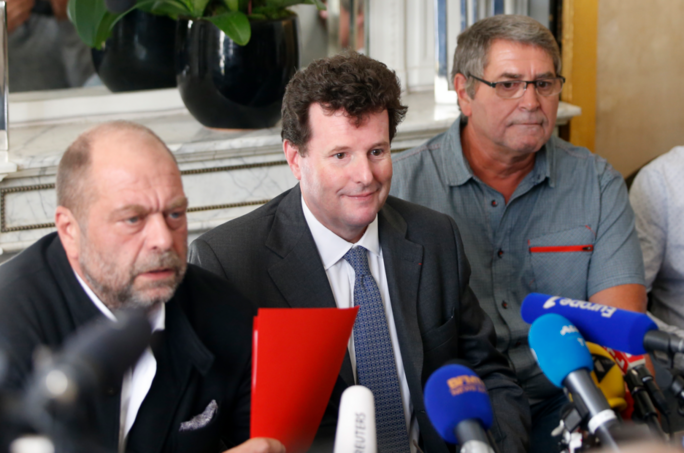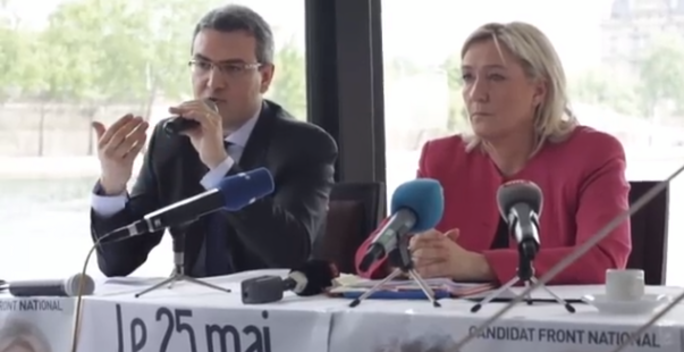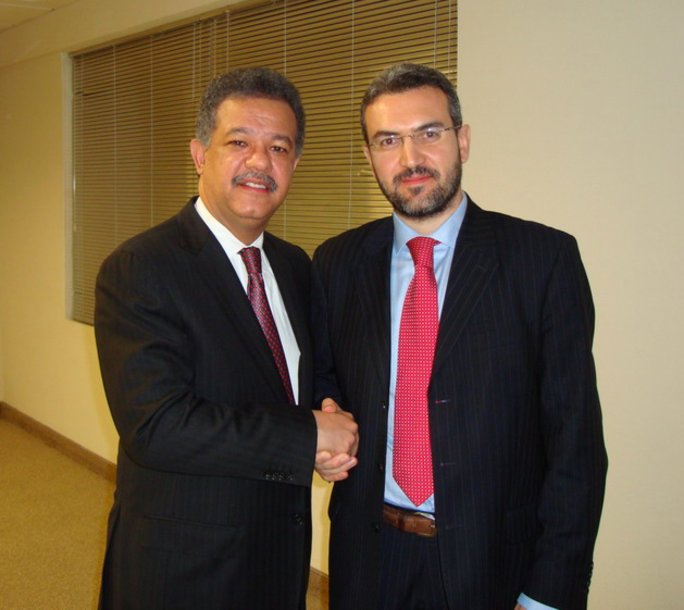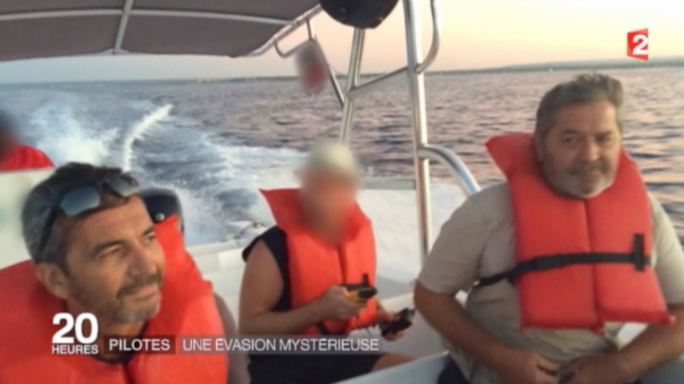It was a dramatic and bold operation that inevitably grabbed the headlines in France. Two former French military pilots staged an incredible escape from the Dominican Republic where they had been convicted on cocaine-smuggling offences. Pascal Fauret, 55, and Bruno Odos, 56, who were under house arrest pending an appeal against their conviction and a 20-year jail sentence handed down in August 2015, were spirited away from the Caribbean country in a speedboat in a commando-style operation with the apparent help of former military colleagues.
But as well as the legal and human drama of the two men's flight, there are also diplomatic dimensions to the saga, with the Dominican Republic saying it will issue an arrest warrant against the two men. And there is also a political twist too, with the two pilots receiving the support of a number of French politicians, most notably Aymeric Chauprade, a far-right Euro MP and former advisor to Marine Le Pen, who visited the two men shortly before they fled and has subsequently admitted his direct involvement in the operation.
According to the details emerging about the escape of the two pilots, who arrived back in Metropolitan France on the weekend of October 24th and 25th, the escape plan may have cost as much as 100,000 euros and involved around ten people, some of whom, according to a source quoted by Le Monde newspaper, were serving French marines and agents from the external intelligence agency the Direction Générale de la Sécurité Extérieure (DGSE). “Some Dominicans and some agents of the French state took part in this extraction, without having received the green light from their respective states,” said the source. Other reports said that those involved included “former navy personnel” and former members of the French air force. The French government itself said little other than to deny any involvement in the plan and to confirm that, in accordance with France's long-standing policy, there was no question of the two men being extradited from French soil.
The first man who claimed responsibility for organising the extraction was Christophe Naudin, a well-known aircraft security consultant who is a familiar figure on French television news programmes as a studio expert when air disasters occur. He told RTL radio during the week: “Other people dealt with the financing problems … but it was me who established the budget.” Naudin claimed he had come up with four different scenarios for the extraction, one involving a helicopter and another jet skis, before choosing a speedboat. “At the last minute I chose the least risky option,” he said.
At a press conference on Tuesday October 27th, Bruno Odos said they had little choice but to leave the Dominican Republic – his lawyers deny that they have “fled”. He said: “The justice system did not open an investigation, it did not listen to us and we were sentenced to 20 years in jail just because we're French and not good Christians. I'm sorry, but my first instinct was to return to my country where I could speak before a functional justice system and try to go back to a normal life.”
Later, interviewed on France 2 television, Odos reacted with irritation when asked about the details of the operation and who paid for it. “That story doesn't interest me at all. What matters is what happened before and what is going to happen now,” he said (see video, in French, below).
However, the details of the operation and in particular the high-level support for it were still emerging during the week, giving the saga a growing political dimension. Several elected representatives have been working hard on behalf of the two pilots since their arrest in March 2013, when the authorities in the Dominican Republic say they found around 600kg of cocaine on the private jet they were about to fly out of the country, and since their conviction in August 2015. Among these are the Euro MP Aymeric Chauprade from the far-right Front National, senator Olivier Cadic from the centrist UDI, and MPs Christian Kert and Jean-Pierre Maggi, from the right-wing Les Républicains and Socialist Party respectively. Two high-profile lawyers were also present at the two pilots' press conference on Tuesday, Éric Dupond-Moretti and Jean Reinhart, both of whom are said to be close to former president Nicolas Sarkozy.

Enlargement : Illustration 2

It is true that the two MPs have been more cautious since the news of the escape broke, with Christian Kerr saying he disapproved of the extraction, and Jean-Pierre Maggi saying that he “understood” it, while noting that “the very elaborate circumstances are intriguing”. But others were wholehearted in their support for the escape from the Dominican Republic. Olivier Cadic, for example, did the rounds of the media to express his “delight” over the return to France of these “two marvellous guys”. He declared: “It is my conviction that they have done nothing wrong.” He added: “They are soldiers. They have defended France. That's why they had to be defended.” When asked about whether he was aware of the operation to get them out of the Dominican Republic he replied: “No comment.” He then continued: “In relation to this affair you must understand, too, that one has to protect the people who took part.”
Conférence de presse cet après-midi pour la défense de Pascal & Bruno avec leurs avocats. #AirCocaïne pic.twitter.com/bPYzpwdES8
— Olivier Cadic (@OlivierCadic) October 27, 2015
But it is the role played by another elected representative, the Front National's Aymeric Chauprade, that has caught the headlines. The MEP has vociferously supported the pilots for several months now, with tweets, press releases, videos and meetings. “Going on appeal before a corrupt justice systems is pointless,” he tweeted on October 22nd.
Les pilotes français et leurs familles peuvent compter sur mon engagement constant depuis le début de l'affaire. pic.twitter.com/IuBryuyoa4
— Aymeric Chauprade (@a_chauprade) August 15, 2015
On October 17th, just before the two men fled the country, Aymeric Chauprade dined with them in Santo Domingo, the country's capital, and captured the meeting on his Twitter account. “I dined with them … they didn't hide their intention to leave,” the MEP told BFMTV on Tuesday, adding that he was “very happy with the success of this escape”.
Avec nos pilotes français innocents, ce lundi à #SaintDomingue. Volonté sans faille de s'en sortir. pic.twitter.com/W48B8Qta2V
— Aymeric Chauprade (@a_chauprade) October 21, 2015
However, after initially being coy about his role in the extraction - “I know a lot of things … I took part in this escape with my head and my heart” - the MEP finally admitted that he had overseen and helped to organise part of the plan alongside Naudin. He told Paris Match magazine late on Thursday, October 29th, that there had been “two separate teams” for the extraction of the two pilots, one in the Dominican Republic itself to remove them by sea, the other for the return to France. “I was the head of team 1 – in the chronological order in which it was carried out – and Christophe [Naudin] head of team 2,” said Chauprade.
The MEP said that for him it was a question of rescuing “compatriots in danger...moreover, former soldiers”. And Chauprade made clear that the plan had been hatched immediately after the pilots were convicted in the summer. “On the day of their conviction, last August, everyone who was active on their behalf understood that they wouldn't get out by an appeal judgement,” he told the magazine. “They spoke about it to Christophe Naudin, who came to see me. He told me the idea had crossed his mind too. 'We'll think about the way to do it' he told me,” said the MEP.
Aymeric Chauprade, Marine Le Pen's former special adviser
The admission that Chauprade was directly involved did not come as a huge surprise. The magazine Valeurs actuelles and Le Monde had already reported that the MEP had reserved in his name a helicopter that was initially supposed to be used to create a diversion during the extraction. “He had put an option on the hiring of a helicopter, that's common practice in Santo Domingo. But it was not used,” an ally of the MEP told Mediapart at the time.
Chauprade himself had been evasive when first questioned on his role. “Obviously the French people have understood that I knew a lot of things.” He also emphasised his “role as an elected representative”. One of the pilots, Pascal Fauret, had also sought to play down the MEP's involvement. “He gave us his support on a personal basis like thousands of people, nothing more. He came to visit us. He's a politician, he often takes photographs with people.”
It is not the first time that Aymeric Chauprade has played the facilitator in international matters. This 46-year-old international consultant and 'geopolitician', as he describes himself, who was once a close ally of nationalist politician Philippe de Villiers, is first and foremost a man with contacts.
Chauprade has become one of the iconic figures for the national identity movement in France ever since the 2008 publication of his book Chronique du choc des civilisations ('Chronicle of the clash of civilisations'). The book led to him being removed from teaching geopolitics at the French defence college the Collège interarmées de défense (CID) in 2009 by then defence minister Hervé Morin. He had apparently been circulating theories that case doubt over “the 'official' truth of September 11” 2001. Chauprade has also not severed ties with other spheres of the extreme right that even the president of the FN, Marine Le Pen, considers unsavoury: the political movement Action Française, the Catholic movement Renaissance Catholique, and the nationalist and national identity magazine Synthèse nationale.

Enlargement : Illustration 6

However, that has not stopped Marine Le Pen from calling on his services. From 2010 Chauprade advised her on international affairs and gave her access to his network of contacts. He became head of the party's list for the Paris region in the European elections in May 2014, and at one time was also head of the FN's group of MEPs at the European Parliament and Marine Le Pen's official advisor on international affairs. However, he lost the last two positions after a video appeared in which he suggested a parallel between radical Islam and Nazism. Nonetheless he still has influence with Marine Le Pen and organised her trip to Egypt in May 2015.
Aymeric Chauprade is a supporter of strong ties between France and Russia and is a key figure in the pro-Russian section of the Front National. He is a friend of Russian financier Konstantin Malofeev – who is close to Vladimir Putin – and was the intermediary who facilitated the first Russian loan, for two million euros, signed by Jean-Marie Le Pen in April 2014, as Mediapart has reported. There was also controversy over his visit to the Crimea, a month earlier, as an “observer” at the referendum organised to rubber stamp Russia's annexation, and at the invitation of an obscure pro-Russian group set up by a Belgian neo-Nazi.

Enlargement : Illustration 7

In his biography on his website RealPolitik.tv, Chauprade boasts that he has a “large contacts book of international addresses” and says that he set up his own advice consultancy “to respond to requests for experts assessments from large French groups and Swiss banks”. He has advised several international personalities, such as the Moroccan king Mohammed VI. He was, interestingly, also an adviser to the then president of the Dominican Republic Leonel Fernández between 2009 and 2012.
And today Chauprade now admits he was directly involved in the extraction of the two pilots from the Dominican Republic. His team say they see nothing astonishing about his involvement. “Aymeric has very strong links with these pilots, he is himself a former officer in the navy reserve,” says a person in his entourage. “He has fought for their release for two years now. In essence he was attracted by their distinctive profile: they are the elite of the army elite, who flew with nuclear weapons. That's something! He went to Santo Domingo several times, it's a country he knows very well, including its faults – lots of corruption and a justice system that functions badly.”
For the Front National the party's vice-president Florian Philippot said that he was “not aware of anything” concerning the extraction and said that if Aymeric Chauprade had been involved it was “in a private capacity”. On RMC radio the Front National MP Marion Maréchal-Le Pen, who is close to Chauprade, said she “congratulated” him on his supportive actions “from the first day” for the two pilots. “The French state should have taken charge of this. It is somewhat unfortunate when you are obliged to go by indirect means,” she said.
A Falcon jet full of cocaine
Now they are back on French soil the two pilots will still have to answer questions about the cocaine saga, which in France is known as the 'Air Cocaine affair'. “France will apply the law. We don't extradite French citizens when they are in our soil,” the government's official spokesman Stéphane Le Foll said on RTL radio on Wednesday. But the Elysée made it clear to Le Monde on Wednesday that “there will be no impunity”.
Indeed, the affair has been the subject of a separate French investigation that was opened by prosecutors at Draguignan in southern France in January 2013 before being handed to two investigating magistrates from the specialised inter-regional unit the Juridiction Interrégionale Spécialisée (JIRS) at Marseille in March 2013. Pascal Fauret and Bruno Odos, who were given 20 year jail sentences in the Dominican Republic on August 14th, 2015, were also placed under formal investigation – one step of charges being brought - by the French authorities for “importing drugs as part of an organised group”, “criminal conspiracy” and “money laundering”. They are suspected of having been involved with three suspect flights before the one for which they were arrested in the Dominican Republic.

Enlargement : Illustration 8

The two pilots were questioned by the investigating magistrate Christine Saunier-Ruellan, from Marseille, who travelled to the Dominican Republic to quiz them on May 22th and 23rd 2013. The transcripts of the questioning, to which Mediapart has had access, are quite illuminating. The two friends, both former fighter pilots, had left the armed forces after 20 years to take up the more lucrative business of flying private jets. In front of the judge they posed as victims of a set up and complained both about their arrests two months earlier and the conditions of their detention.
Having become involved in a small business aviation business called SNTHS, the transcripts show the pilots to be at the very least incurious or incautious as to what they were carrying on their planes. The plane they were on when arrested belonged to the businessman Alain Afflelou, who hired it out to SNTHS when he did not use it, to reduce maintenance and running costs.
“You're no novice as a captain. It wasn't the first time that you flew routes between the Caribbean and Europe, was it?” judge Christine Saunier-Ruellan asked Bruno Odos.
“I had already flown to Guadeloupe,” replied Bruno Odos.
- You can't have been unaware that drugs, particularly cocaine, circulate between the two regions, can you?
- I was totally unaware that there could be cocaine trafficking between these two regions
- Doesn't cocaine have the characteristics of a substance that could represent a risk to safety, health, salubrity or orderliness on board the aircraft, according to the terms of the civil aviation code (now the transport code)?
- I am not a specialist in cocaine.
- Were you aware that under the application of the earlier cited articles L6522-3, L6522-4 of the transport code, you had responsibility for the cargo and the option of disembarking a cargo that 'could represent a danger to safety, health, salubrity or orderliness on board the aircraft'?
- I can't open the luggage. But any captain can disembark someone who could become violent, and if a suitcase is oozing a product that seems dangerous, you can ask the passenger to open the suitcase.
- What would you have done – as captain – if you had discovered that these suitcases contained cocaine leaving Puerto Plata? [editor's note, in the Dominican Republic]
- I would have called for help on the radio, the control tower first of all. Then I would have brought in the authorities.
- Did it not seem curious – to you, as captain – to see the plane chartered just to fetch suitcases?
- In 12 years of the job I have seen all sorts of things. For example, moving house between Beirut and Djerba. I have lots of examples.
- It didn't seem suspicious to you to see suitcases loaded onto the aircraft without passengers corresponding to the suitcases?
- I didn't see them loaded.
The questioning of the second pilot, Pascal Fauret, the following day, was equally tense.
“A dozen suitcases for one passenger, that didn't seem strange to you?” asked the judge in relation to another suspect fight.
“No. The plane is hired in its entirety,” replied Fauret.
- You have a passenger on the way there who leaves with one suitcase, you land in the Dominican Republic and you stay three nights. You leave with the same passenger and these suitcases have multiplied. That didn't seem strange to you?
- Clearly he came to fetch suitcases. You take the precaution of leaving from an international airport, to make a stopover at an international airport and to warn the customs service at your arrival. From the moment that you go through the screening, and you pay taxes for that, you don't worry about it. We're not gendarmes. If we'd seen something illicit, we'd have referred it to the airport authorities.
- You take on board a passenger who you take to the Caribbean, who leaves with ten suitcases delivered to the airport by an unidentified person and you're not worried?
- Not at all. I'm not responsible for what is in the suitcases.
- Isn't the captain responsible for the aeroplane's cargo, with the ability to refuse suspect cargo?
- The captain is not responsible for the cargo. He must just make sure that the hold is properly closed. I have never seen suspect baggage, and from the moment that it passes through the screening I can't see myself traumatising the passenger over the luggage contents. I can't see myself asking Alain Afflelou what the luggage contains.
- Had you already seen Afflelou leaving with one suitcase and coming back with ten suitcases?
- One to ten, I don't know.
- What style of suitcase was it?
- Standard luggage.
- You're no novice at flying an aeroplane. It wasn't the first time that you'd flown on routes between the Caribbean and Europe, was it?
- The last time goes back to 2002.
- You're not unaware that drugs, particularly cocaine, circulate between these two regions, is that so?
- Certainly I know, but using three international airports with customs, I consider that to be on the verge of stupidity. Nothing is safer than an aeroplane flight. It's not the most suitable method for this kind of situation.
- And yet?
- I know now.
Apart from the two pilots, two other French citizens, Alain Castany and Nicolas Pisapia were arrested in the same Falcon 50 jet on March 19th, 2013, at Punta Cana airport in the Dominican Republic. They have remained in the Caribbean country after their conviction and the extraction of the two pilots has left them fearing that their sentence will be confirmed on appeal.
In the 26 suitcases that were on board the private jet – in the hold but also the passenger cabin – the Dominican police found 680 packets containing 630 kilos of cocaine. At the time 35 people from the Dominican police, customs and aviation authorities were also arrested. The plane was due to have landed back at Saint Tropez in France, where French gendarmes were waiting after they, too, received a tip-off.
The French aspect of the 'Air Cocaine' investigation, which is still being run from Marseille, involves the main people involved in the Dominican saga – including the two pilots – and also a French customs officer based in the Var département or county in southern France and the people behind the aviation firm Société nouvelle Trans-hélicoptère service (SNTHS). The central figure in the French investigation is a man called Franck Colin, who is suspected of being the person who organised the smuggling on behalf of Spanish traffickers. He is the only one of all those placed under formal investigation to still be in temporary custody in France.
During the course of her enquiries examining magistrate Christine Saunier-Ruellan came across the name of former president Nicolas Sarkozy. The judge discovered that between December 2012 and February 2013 the SNTHS company had taken the former head of state on flights paid for by one of his friends, the businessman Stéphane Courbit. This part of the inquiry was in the end judged to have no link with the drug trafficking and was handed over to judges at the financial investigations unit in Paris. They are now investigating the potential misuse of company assets at the expense of the Lov Group, founded by Stéphane Courbit, to whom those flights were billed.
--------------------------------------------------------------------------
- The French version of this article can be found here.
English version by Michael Streeter


